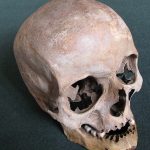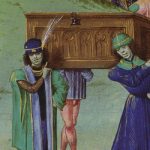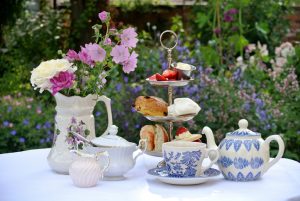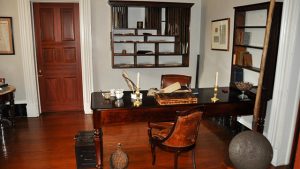
Bill helped Phyllis off the ferryboat to Fig Tree and onto the wharf. He’d thought about taking her to one of the pleasure gardens in Middle Harbour, but this place, tucked up the Lane Cove river, was less showy, so with luck none of her family’s highfalutin friends would be around. The gossips would have a field day. The daughter of one of Sydney’s wealthiest men seen on the arm of a larrikin gardener!
‘Welcome to Fairyland, Phyl.’ Damn silly name, but never mind. Just seeing Phyllis’s face as she glimpsed the people picnicking beyond the paperbarks was a delight.
‘Ooh Bill, I’ve heard about this place,’ she exclaimed as he led her up the grassy bank. ‘How wicked I feel! lf my parents ever find out I’m not at Joan’s.’
Bill kissed the tip of her nose. Phyl was such a sweetheart. Every time she peeped up at him with those soulful eyes of hers from beneath her parasol, he felt he could die out of sheer love for her.
‘Mum’s the word, eh? Thought you deserved a treat.’ Feeling like a real toff with her on his arm, they joined the other couples heading for the pavilion. He’d not been here before either. Must have taken some work, cutting back the mangroves, clearing the thick bush for the strawberry farm and later getting the lawns started. Strewth, he mustn’t think like a gardener today. Today he was Phyllis’s beau.
She gazed at the wooden dance floor as though she’d never seen one before, and maybe she hadn’t. Her hoity-toity parents were so blessed strict. He would make sure that today was real special. He hadn’t told her yet, but he’d got his call-up, Tomorrow he had to report to the barracks and could be on a troopship, off to the war in France in no time, Yes, today was really special.
Sydney, November 1938
JEAN left the passenger ship at Circular Quay, and by the time she had caught a tram to the YWCA, unpacked her few belongings, then had a little walk along George Street – so different from St George’s Terrace and the quieter pace of Perth – to the Town Hall, she was pleased she’d saved up to come. Sydney was exciting. Walt Disney’s Snow White and the Seven Dwarfs was showing and some of the girls at the YWCA said they’d take her dancing at the Trocadero.
And Sydney had trains that went underground! The young ticket clerk at Town Hall Station had said Jean would need to catch one of those to go to Mrs Dalrymple’s. Turramurra was ‘out in the sticks’, he said. ‘Lah-di-bloomin-dah,’ he added with a grin and a glance over his shoulder in case his supervisor was listening. The thought of catching a train all the way out there made Jean’s insides a bit queasy, but the young man had said it wasn’t difficult and she wouldn’t have to change trains or anything like that.
With only ten days in Sydney, Jean decided she’d better get the hardest part over first, so cranking up her courage, she made the phone call she was dreading. A posh voice at the other end invited her to morning tea the next day to talk about ‘dear Phyl’. Dear Phyl, the mother Jean had never heard of until three months ago.
Next morning, with an Agatha Christie book to read on the way, she descended down to the platform. The train roared into the cavernous station. Wait until she told her friends about this and the terrifying hurtle through the darkness. And she could have wept for sheer delight when the train came out into the sunshine and she found they were not only actually crossing the Harbour Bridge, but the city lay spread out on either side of her.
The Agatha Christie lay forgotten in her bag as the terraces of North Sydney gave way to tree-lined avenues. Purple was everywhere in the gardens, frontiers of agapanthus and so many jacaranda trees.
Nearly every station featured a high street of shops and one or two even had a movie theatre. Allotments and orchards dappled the slopes and Jean could glimpse the Blue Mountains to the west, but to the north and east, the horizon was now thick with trees and the houses were fewer.
It took half an hour before they drew up at the platform at Turramurra, and to Jean it really did feel like being out in the sticks. Scary really, but then she saw there were homes, well, mansions, among the trees.
She found Mrs D’s house all right, but didn’t know Mrs D from a bar of proverbial soap. The lady had written to her mum last year, telling her that Jean’s mother had died. Her real mother! Lord, that had been a shock, to discover she’d been adopted.
‘Jean, is it? Do come in, child,’ A little woman in an elegant black dress came towards her and extended a hand. It was all so proper. The maid wheeled in a trolley with teacups and plates of dainty sandwiches, Jean nearly spilt her tea she was so nervous, but her hostess soon abandoned small talk. A framed photo was removed from the piano and passed to her, followed by an album of snapshots.
‘That’s Phyllis when she was younger, and that was last year before she got ill.’
‘How did you know who my par…foster parents were, Mrs Dalrymple?’
‘Phyllis found the adoption details in her parents’ papers after her father passed away. She made me promise if anything ever happened, I should write to your adopted parents.
‘We go back a long way, Phyl and I. We were friends as children, then she married Harry, a friend of my husband’s. Harry’s overseas at the moment so you can’t meet him. In any case, it wouldn’t be appropriate. He wasn’t your father.’
‘Do you know who was?’ There, it was out, easier than she’d thought.
‘Oh lord, I knew you’d ask that.’ Mrs D sighed. ‘Phyl once mentioned a man called Bill O’Dea. Handsome fellow. Used to do her parents’ garden until he was called up for the war. I don’t think he made it back. He always made her laugh, she said. She must have been fond of him because I remember looking at photos with her some years later, and there were tears in her eyes as she showed me one. ‘There’s Bill,’ she said. It was really a snap of her parents, but he was in the background. He looked a nice sort.’
BILL was halfway through engraving the morning’s job when he noticed a girl watching him from across the road. He set down his chisel and stared back. There was something sweet about her as she looked at his name above the door.
People were mostly sad when they came to see him, when they had lost someone they’d loved. He stopped whistling, wondering if the kid had ever done this before, ordered a headstone.
‘Can I show you around, luv?’ he called out as she came in.
‘Mr O’Dea?’ Such bright, beautiful eyes she had. How he wished he were twenty years younger.
‘Certainly am,’ he replied.
There was a plucky edge to her smile. ‘It took me a while to find you.’
She trotted after him as he showed her the sandstone, granite and marble and the choice of lettering. ‘For your mum, is it?’
‘Yes, sort of.’ It was the breathless way she said it that plucked some forgotten chord in him. His friends said he was a good listener and sometimes his customers needed to talk. Like now. ‘I’ve just come from her grave.’
Brave little thing. He didn’t ask if she wanted tea, just lit the gas stove. ‘What’s on your mind then?’
He expected her to say, ‘granite or …’, but she raised her eyes to his, searching his face. ‘I think you’re my father.’ It was Bill who needed the cuppa’. In fact, he also needed the slug of gin he poured into it.
The names she – Jean, her name was – babbled out before he even asked. Oh, he knew them. Names he hadn’t heard for the last twenty or so years. He couldn’t find words straight away, just looked at her. She had made a real effort to find him.
She waited for his answer, gazing with eyes that could have been those of his beloved Phyllis. Phyl’s daughter. His daughter! Bill could have wept. Instead, he somehow reached the door where, shakily, he stood for a moment, collecting himself, before he turned the open sign to ‘closed’.
Then he came back to the questioning young face and for the first time told his side of it. How Phyl’s parents had been so toffee-nosed, wanting her to make a ‘good’ marriage. With rusty love, he began to speak about Phyl, trying in these few precious minutes to make her more than a name on a birth certificate. He’d been able to make Phyl laugh, taken her to a few places, like the day out at Fairyland. But for this child of his who looked at him with her soulful eyes, the memories weren’t enough. Phyllis’s daughter, who Phyllis would never know. Oh, how could he give Jean back her mother?
‘Come on,’ he said. ‘I’ve a couple of places to show you.’
It was hard to find where Fairyland had been. There was a path of sorts, but the jetty was gone and the bush had grown back. Hard to believe there’d been anything there, but he found the tree carved with their initials and Jean stroked her fingertips across her mother’s and listened as Bill told about the only afternoon he’d spent with the woman he loved.
‘This is the first place,’ he said. ‘I still daydream about that day. But there’s somewhere else just for you, but we need to go back to the harbour to find it.’
THE jacaranda tree stood in full glory, like the queen of trees that she was, beaming out at the glassy water between the bridge and Kirribilli, Behind the tree was a flight of garden steps and up there Phyllis’s family had lived with their expensive view, their sulks, their snobbery and their servants. The mansion was divided into apartments now.
‘She lived here?’ Jean spoke in awe.
‘Until she was married. And that,’ Bill smiled towards the jacaranda, ‘that’s your tree, Jean.’
‘Mine?’ She stared at it in puzzlement.
‘The hospital where your mother went used to give each new mum a little jacaranda seedling. The north shore is full of jacarandas now. The people at the hospital wouldn’t let your mum have one because you were being adopted. So when Phyl was well again, what does she do but go to a plant nursery. She bought the seedling and planted it. She said that as she watched it grow, she would think of you and that as long as the tree was all right, she knew you were. Just her fancy, see. But it helped with the grievin’ for you.’
‘So you saw her again?’
‘Just the once, but she didn’t see me. They had married her to some toff by the time I got back from the war. She was standing just here. So unhappy. Strewth, I longed to speak to her, God knows I did. But what was the use? Divorce? No, I couldn’t bear the thought of her name in the headlines. They’d have called her a slut who liked a bit of rough. Me, who loved her.’ The phrases were harder to find now.
‘Maybe I should have asked her what she wanted instead of making the decision for both of us. It seemed kinder that she thought I was gone for ever, that’s all.’
‘That took a great deal of courage,’ said Jean.
‘My word, it did.’ His voice faltered for an instant. ‘So I kept away, but Sal, her parents’ cook, used to tell me how your mother was. An’ the years went by. I married and set up as a stonemason. Found I had a real feel for it. I didn’t know Phyl had passed away until her husband commissioned me to do her stone. I gave her the best an’ put my own line on it – love changeth not.
‘What did you do that for, you idiot’ says her snooty husband. ‘I ain’t changin’ it,’ I tell him. And I let him think it was just an error.
‘It’s beautiful, You did love her.’
‘Like there was no tomorrow, but I didn’t mean to give her grief like a baby coming along, But looking at you, lass, I don’t regret it.’
His daughter stood and stared up at the beautiful tree. Its splendour almost filled the garden. She reached out, touched the bark-with reverence, then wrapped her arms around it and wept.
Her real mother hadn’t given her up. All through the years she had cared. She had truly cared.
And Bill smiled at the steps where Phyl once used to sit with a book open on her lap, pretending to read while he raked the leaves. ‘Our girl, Phyl,’ he said. ‘Meet our girl.’
Copyright Isolde Martyn





